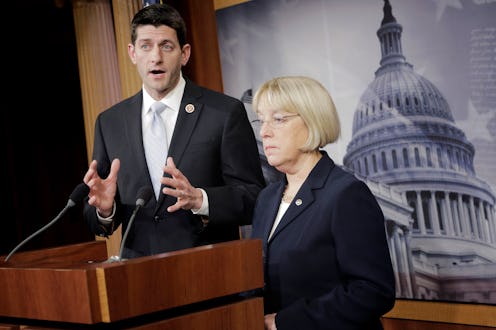News
House Passes Budget Deal
The House of Representatives has passed the Murray-Ryan budget deal, a modest government funding measure that will undo some of the sequester’s draconian spending cuts and, to Ted Cruz’s horror, ensure that there won’t be another government shutdown for the next two years. The bill sailed through with broad bipartisan support, 332-94, and now heads to the Senate, where it will probably be passed without much trouble.
As Bustle reported yesterday, the budget deal doesn’t do all that much. It doesn’t change or restructure entitlement spending in any way, so Social Security and Medicare benefits will remain as they are. It doesn’t extend unemployment benefits, either, something Democrats were not happy about (Nancy Pelosi reportedly told her caucus to “embrace the suck” of the bill), and it doesn’t raise the debt ceiling. It does add $45 billion to the government’s budget in 2014 compared with where it would have been otherwise, and adds an additional $20 billion to the 2015 budget. It also pays off $20 billion of the deficit.
Normally, the money for this increase in spending would come from new tax revenue, and in effect, it will: The deal adds a three dollar tax to airline tickets. However, because Republicans would be punished by Grover Norquist if they voted for a tax increase, Murray and Ryan referred to the tax a “fee” instead, so everyone can say they technically didn’t vote for a tax increase. That’s sort of like a child asking for a second piece of cheesecake after dinner and justifying it by referring to it as a midnight snack instead of a second desert, but hey, whatever works. The bill also cuts contains small cuts to military and civilian pensions.
Will the measure pass the Senate? Probably, despite the fact that a couple of prominent Republicans have come out against it, as most of the Democratic caucus will likely vote for it, and it only needs a few Republican votes to pass.
In general, this is kind of a snoozer. The government will remain funded, and spending will go up by a little bit. Yawn. In addition, as Jonathan Chait points out, the nature of this deal actually makes a future budget compromise unlikely:
The parties have reached a deal because the cuts to next year’s budget run so deep that Republicans themselves cannot tolerate them. The budget process in the House simply collapsed because even conservatives couldn’t implement the slated levels of spending. The impasse threatened to require more temporary votes to keep the government open, and possibly another shutdown, which is the GOP’s worst nightmare. And so Ryan and Murray scrounged together enough savings to offset the cost of a small two-year fix. But since the savings they agreed upon were, by definition, the most agreeable cuts, any future deals will become much harder. The low-hanging fruit is all gone.
And so, while it’s all well and good that Congress reached a bipartisan agreement about anything, this isn’t as significant as some are making it out to be. It’s purely a result of circumstance and timing, and doesn't represent a sea change in the how the two parties go about policy and politics.
